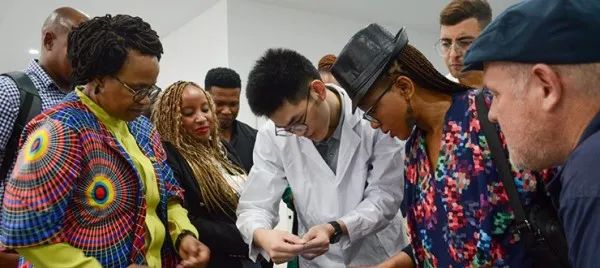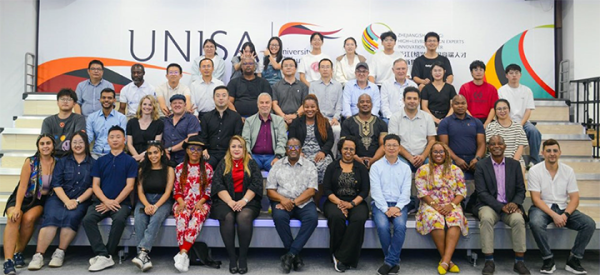In the week of 14 to 18 October 2024, a delegation from Unisa travelled to China’s Zhejiang Province to strengthen its relations with the country through the signing of memoranda of understanding (MOUs) with two universities and co-hosting an Artificial Intelligence-Enabled Economy Symposium.

Prof Thenjiwe Meyiwa and Prof Yinjin Hu, Vice President: Shaoxing University
The MOUs were signed with Zhejiang Sci-Tech University and Shaoxing University, both of whom have strengths in artificial intelligence (AI) research, information technology, foreign languages, material science engineering and textile engineering. The MoUs between Unisa and these universities are founded on
-
joint research project collaborations.
-
joint master’s and doctoral student supervision.
-
student and staff exchanges.
-
hosting joint conferences and symposia.
Zhejiang Sci-Tech University and Shaoxing University are research-intensive universities that receive support from their local government. Unisa’s existing partnership with JAR Partner led the university to its engagement with Zhejiang Sci-Tech University. JAR Partner acts as a bridge between foreign entities and their Chinese counterparts, and provides comprehensive services to foreign, environment-friendly, high-tech companies, experts and talents, especially focusing on the research and development fields such as textiles, robotics, computer science, bio-nano medical engineering, and new materials.

Prof Thenjiwe Meyiwa and Prof Biyu Zhou, Vice President: Zhejiang Sci Tech University
“The relationship that we have with JAR Partner has exposed us to other universities, industries and government entities in the Zhejiang Province in China,” said Prof Bhekie Mamba, Executive Dean, Unisa College of Science Engineering and Technology (CSET). He continued: “Through this partnership, we are hopeful to jointly apply for bi- and multi-lateral funding such as the BRICS funding. The applications submitted will be based on existing and mutual relations rather than searching online for researchers based in China or South Africa for the sake of submitting a joint funding application.” The MoU with Zhejiang Sci-Tech University was signed on 16 October 2024, while that with Shaoxing University was signed on 17 October 2024.

Prof Bhekie Mamba with Mr Jiaping Zhang from JAR Partner receives a plaque for the joint Unisa-JAR Labs
The relationship between Unisa and JAR Partner commenced in August 2022 through CSET, following which an MoU was signed in May 2023. Unisa’s particular focus in collaborating with universities in China, through partnership with organisations such as JAR Partner is centred on the following key objectives:
-
Joint postdoctoral research projects: Establishing a robust pipeline of joint research projects with Chinese partners, focusing on areas of mutual interest like agriculture, healthcare, and renewable energy.
-
Knowledge exchange programmes: Facilitating regular exchange programmes between Unisa and Chinese universities and research institutions, fostering collaborations and building capacity.
-
Technology transfer: Working with JAR Partner to facilitate the transfer of cutting-edge technologies from China to South Africa, fostering innovation and economic growth in key sectors.
-
Start-up incubation: Creating a joint incubation programme that supports the development of high-potential startups in South Africa and China, leveraging the strengths of both economies, and investing in programmes that enhance the research skills and innovation capabilities of researchers and entrepreneurs in both countries.
These initiatives are not only about academic advancement; but they are also about creating real-world solutions to challenges facing our world. They provide a social innovation platform for companies, investors into technologies, and governments. The partnership is indeed a model of how institutions can come together across borders to share knowledge and co-create technologies that have a global impact.
Since then, JAR Partner has been instrumental in providing links to other stakeholders such as MoreD Intelligent in Hangzhou, China, who are currently working with Unisa researchers from the Centre of Augmented Intelligence and Data Sciences (CAIDS) at CSET. MoreD Intelligent provides efficient proctoring solutions that will address the current assessment and examination challenges, and the subsequent backlog of disciplinary cases that come as a result of academic dishonesty and plagiarism that takes place during examinations and assessments.
Launch of the Joint Unisa-JAR Partner Laboratories.
On 17 October 2024, the Joint Unisa-JAR Partner Laboratories were officially launched at the High-level Foreign Experts Innovation Centre in Zhejiang Province, Shaoxing, China. The research focus areas in the joint labs are on reverse osmosis/cooling and pipe freeze crystallisation technologies for cost-effective treatment of highly saline water, and the manufacture of carbon fibre and micro-nano materials, high-density supercapacitors, zinc-air batteries, and AI technologies, amongst others.

Unisa delegation touring the joint Unisa-JAR Labs
Speaking at the launch, Prof Thenjiwe Meyiwa, Unisa Vice-Principal for Research, Postgraduate Studies, Innovation and Commercialisation, said: “Unisa believes deeply in the power of collaboration, and in the potential of shared knowledge to drive positive change. We believe that the challenges of the 21st century cannot be solved in isolation. Through collaboration with global partners, we can pool resources, expertise, and innovation capacity to tackle global issues.”
The joint launch was attended by Zhejiang Province leaders at provincial, municipal, and district levels, the Zhejiang Provincial Foreign Experts Bureau, business representatives, and experts from both China and abroad.
In closing, Meyiwa said: “As we look to the future, Unisa is committed to enhancing our research, innovation, and commercialisation efforts. Our collaboration with China, particularly through the JAR Innovation Centre, presents not only an opportunity for academic advancement but also a moral imperative: to ensure that technology benefits all, especially the most vulnerable members of society. We are confident that our partnership will lead to groundbreaking advancements, contributing to sustainable development in both our countries and beyond. As we strengthen our collaboration with Shaoxing University, Zhejiang Sci-Tech University, and Zhejiang Dongsheng Huigu Investment Development Co., Ltd., we are excited about the potential that lies ahead.”
Unisa-JAR Partner Joint Artificial Intelligence-Enabled Economy Symposium
On 18 October 2024, Unisa and JAR Partner co-hosted an Artificial Intelligence-Enabled Economy Symposium at the High-Level Foreign Experts Innovation Centre, in Shaoxing, China. The symposium was hosted under the theme “Augmenting Life Through Relevant AI Technologies”. Participation at the symposium included leading researchers and industry experts in the fields of AI and Data Science from Unisa, Shaoxing University, Hangzhou Dianzi University, the Shaoxing Research Institute of Zhejiang University, the University of Shanghai for Science and Technology, and industry practitioners (MoreD Intelligent, China Certification and Inspection Group, STAR.Vision, Zhejiang Hucai Testing, Shaoxing Shangrui Opto electric company, and SAMTECH).

Attendees of the Unisa-JAR Joint AI symposium
The symposium was hosted as a response to the call made by the President of the Republic of China, President Xi Jinping, during his keynote address at the Forum on China-Africa Cooperation that took place on 5 September 2024. The call was made to China and Africa to join hands in advancing modernisation that is just and equitable, while acting in light of national realities. Hosting of international discussions on artificial intelligence and other innovative solutions form part of the first steps towards realising the call.
The symposium showcased various ground-breaking AI and data science innovations and research conducted at the participating institutions. It also covered a range of focus areas including machine learning, natural language processing, computer vision, augmented intelligence and data science.
The symposium provided a platform to showcase research activities being undertaken in the newly approved CAIDS at CSET, under the leadership of Prof Ernest Mnkandla. The symposium was the second to be co-hosted by Unisa and JAR Partner, following a successful Membrane Symposium that was hosted from 26 and 27 August 2024.
The Membrane Symposium attracted the attendance of more than 60 academics and postgraduate students from Unisa, JAR Partner, Tiangong University, the Harbin Institute of Technology, Tianjin University, Nanjing Tech University and the Chinese Academy of Sciences. From Unisa, eight doctoral students and three postdoctoral research fellows, working in the research field of membrane science and technology, gave presentations. CSET’s Prof Edward Nxumalo, Prof Machawe Motsa and Prof Richard Moutloali presented engaging plenary and keynote lectures.
* By Dr Nozipho N Madzivha, Communication and Marketing Specialist (acting), College of Science, Engineering and Technology
Source:Unisa
Publish date: 2024/10/30

